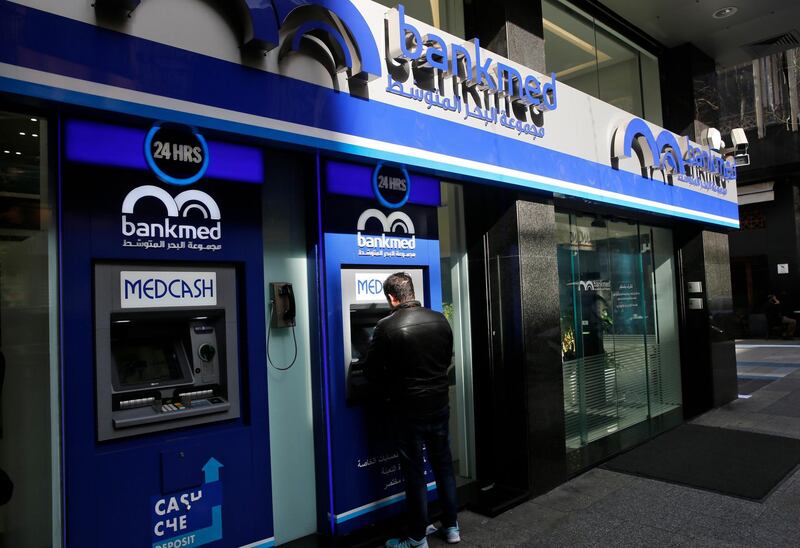Lebanon has welcomed recent financial commitments from regional states who are hoping to help the country survive a serious economic slump.
But in the absence of significant reforms, financial pledges will do little to solve deeply-rooted economic problems, analysts said.
Speaking at The World Economic Forum in Davos on Tuesday, Saudi Foreign Minister Mohammed Al Jaadan said the kingdom is ready to "support Lebanon all the way", without providing further details on the nature of such assistance.
He spoke just one day after Qatar announced it would buy $500 million worth of sovereign bonds to help support the country's finances.
"Lebanon's stability is our region's stability and it's very important for Qatar," Foreign Minister Mohammed Bin Abdulrahman Al Thani told Bloomberg on Tuesday at the World Economic Forum in Davos.
"We took our decision both based on our assessment to stabilize the economy and also as an investment decision, this is a good investment."
The announcement came after Qatari Emir Sheikh Tamim bin Hamad Al Thani attended an economic and development summit in Beirut this week. He was one of only two Arab heads of state to do so.
_______________
Read more:
Lebanon's lucky streak may be fading in face of mounting economic woes
Lebanon’s business conditions in July deteriorate to near two-year low
IMF hopeful of a new government, economic reforms in Lebanon
_______________
Meanwhile, Moody's Investors Service downgraded its credit rating for Lebanon this week, putting it on par with Gabon, Zambia, Iraq and Ukraine.
Moody's downgrade was due to concerns over the government's ability to pay or restructure its debt amid a liquidity crunch that raises the risk of default.
Lebanon has been without a government since parliamentary elections were held in May. This has compounded the economic problems of a country saddled with the world's third highest debt to GDP ratio and is struggling to control its finances amid a stagnating economy and pressure from hosting over a million Syrian refugees.
Lebanon's political class was quick to downplay Moody's announcement and focused instead on welcoming the Qatari investment.
"Despite the report, the financial and monetary situations remain stable", caretaker Finance Minister Ali Hassan Khalil said in response to the report. The Treasury is "able to meet all its commitments, especially (regarding) debt", he continued, adding that "Qatar's subscription to Treasury bonds boosts confidence in Lebanese issuances".
Mr Khalil recently stirred panic in bond markets when he told a local newspaper that the country may restructure its debt. However, he later clarified that Lebanon is committed to paying back all maturing debt.
In Davos, caretaker Foreign Minister Gebran Bassil told CNN on Wednesday that the state of the Lebanese economy wasn't "so bad."
He applauded Qatar's decision to buy Lebanese bonds and said that other countries should follow suit.
"I invite others to do the same because it's safe and with a good return," he said.
"We are in the mood of encouraging the Saudis and other countries (…) to help Lebanon to stay stable".
Qatar's decision represents a short-term stimulus to the Lebanese Central Bank which is facing a liquidity crisis. But this will not alleviate the country's widening budget deficit, says Director of the Levant Institute for Strategic Affairs Sami Nader. The Central Bank has played an important role in supporting the local economy in the absence of strong political leadership.
Qatar's support has also proved controversial considering that it is at odds with Lebanon's traditional backer, Saudi Arabia. In June 2017, Saudi Arabia, as well as the UAE, severed diplomatic ties with Qatar, accusing it of cosying up to Iran.
However, Mr Nader believes that Qatar's move was mostly motivated by a desire to break out of the diplomatic isolation imposed by its GCC neighbours. "It's a smart tactical move but Qatar makes no strategic or financial gain from it", he says.
Saudi Arabia has not offered any significant aid to Lebanon since it cancelled a $4 billion aid package for the country's security forces nearly three years ago. The kingdom claims that Lebanese authorities turn a blind eye to Hezbollah's activities. Today, the powerful Iran-backed party is accused by its opponents of blocking the formation of a cabinet.
"GCC countries have become increasingly hesitant to help Lebanon since the beginning of the Yemeni war and Hezbollah's support to the Houthis", says Mr Nader. "Saudi Arabia has the capacity to save Lebanon from economic collapse but to do so they need guarantees that Hezbollah will not reap anything from it".
In addition to tensions caused by regional politics, Lebanon's failure to form a government has also kept nearly $11 billion of aid pledges made in Paris last April locked away.
Some Lebanese commentators warn that if the status quo persists, Lebanon is headed for disaster.
"It is inconceivable that a country with such a high level of debt continues to dither about forming a cabinet", says Hadi El Assaad, coordinator for the Institute for Finance and Governance.
"Lebanon must find a solution to this crisis so that international help can manifest itself. The capacity of the Central Bank to find solutions for the economy is not infinite".
"Excluding any major shock, we can continue 18 months like this - with no government and no international help - but no more", warns Roy Badaro, economic advisor to the president of the Lebanese Forces, a political party.
“The more we postpone, the less we will be able to adjust”.







